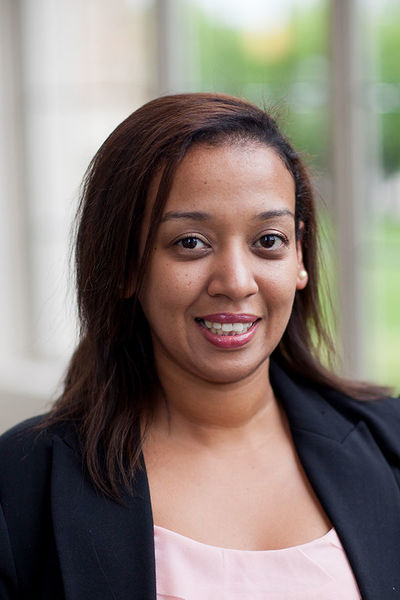 Rania Ibrahim Mohammed
Rania Ibrahim Mohammed
Dr. Rania Mohammed, who earned her M.D. in Ethiopia in 2010 and worked for nearly four years at the Armed Forces Referral Teaching General Hospital, decided during her pediatrics residency to take a new route for greater social impact. At a colleague’s invitation, she became cofounder of Telemed-Hellodoctor Ethiopia, a technology startup aimed at providing patients with instant phone links for physicians in the underserved country. The three-year experience of writing grants, recruiting doctors, and facing startup challenges confirmed her direction.
“It opened my eyes to entrepreneurship and how innovation can solve things,” Mohammed said. “It built up my curiosity. I started to see the world not just as a clinician. I realized that a clinician with business skills can solve problems.”
Last year, Mohammed came to Notre Dame as a fellow with the Young African Leaders Initiative (YALI), a six-week international program managed on campus by a collaboration of institutions including the Notre Dame Initiative for Global Development, the Mendoza College of Business, the Kellogg Institute for International Studies’ Ford Family Program in Human Development Studies and Solidarity, and ESTEEM. Her mentor was ESTEEM Director David Murphy.
“I felt like I needed the soft skills,” she said. “Coming here allowed me to get exposure to that. I shared a lot of my dreams, my aspirations, what I wanted to do.”
She also met Dr. Bunmi Okanlami, a retired intensive care pediatrician in South Bend whose son, Dr. Feranmi Okanlami, graduated from ESTEEM in 2015. When she returned to Ethiopia, Mohammed helped start the Office of Innovative Strategies and Operations and the Office of International Communications and Partnerships, a public-private partnership with Saint Paul's Millennium Medical College. Health care institutions in Ethiopia typically are run by physicians with no business management training, weakening their effectiveness.
“We always use our clinical mind in making our decisions,” she says. “I’ve seen that in so many places, like the Ministry of Health, fail. I feel like what I’m doing here at ESTEEM is helping me come up with an easier way of learning business while implementing it. This is more hands-on, and I get to take what is more useful for me. I get to take it back home.”
Mohammed, who received the first Okanlami Family Fellowship to ESTEEM, is conducting her capstone project with a variant of technology developed in Sunny Shah’s laboratory to provide cervical cancer diagnosis in resource-limited companies, especially East Africa. She says ESTEEM offers a broader experience of the Notre Dame community than her YALI program.
“I feel like in such a short time you feel like you’re already part of the alumni and you have easy access to whomever is valuable to you,” she says. “The class is made up of people from a lot of different backgrounds. It kind of opened my eyes again to see how we really transfer skills among each other. Some of them are working on science products and medical products and have no background in that but have soft skills. Others have the technical skills and need soft skills. That really helped me understand this whole team dynamics. We did a lot of group work at the beginning.”
The host of industry speakers in the program provide insights into an entrepreneurial ecosystem very different from Ethiopia’s. “There’s a difference between here and emerging markets,” Mohammed says. “It’s a very different perspective. Every day is a learning opportunity for me.”
In particular, ESTEEM’s elevator pitches and other communications skills fill a gap in Ethiopia’s system. “Back home, we have a challenge of public speaking – not only communication skills but selling your product, describing it, talking about it, being encouraged to speak,” she says. “We all have these great ideas that come into the market but nobody knows how to pitch it. We lack the skill of delivery. Coming here has shown me the importance of that. These are skills I’m really working hard right now to grasp so I can take them back home.”